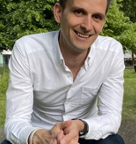The early days of a startup
As I pass the one month working on Slope full-time, I’ve reflected on the experience of starting a company again.
Seven years have passed since I worked on the early stages of a company. I forgot what it feels like to be here. You go from a job that is structured with calls, meetings, and deadlines that created a natural rhythm for you to… quiet.
That is a slight exaggeration, but there is a distinct change. Being an early-stage founder is like being an artist or an academic. You spend a lot of time researching, thinking, creating. These are very rewarding, but largely solo endeavours. There is nobody telling you what to focus on- it is all up to you.
Another difference is the amount of personal investment you put in as a Founder. People often talk about a company being a Founder’s baby. As an actual parent I find that comparison trite. However, you are exposing yourself in an intimate way. And you’re doing it in front of (hopefully) many people- friends and strangers alike. The product is your creation, so it feels like it is a reflection on your ability and the reaction from the market is a commentary on how well you’ve done.
One of the biggest differences for me from company 1 to company 2 is the level of comfort with putting yourself out there. Some things will work, others will not. There is real beauty in that process. Embracing it is powerful.
What I find the hardest is managing the quality improvement cycle. Essentially, the process of getting better as you do more. One of the realities of being a Founder is that you must be able to become a jack of all trades who can perform at a better than average ability at many things. The reality for me is that I don’t want to do anything less than great. I’ve had to coach myself on remembering that the goal is to “do it well enough” to keep progressing to the next level. So far, I’ve focused on product design and development, marketing, and re-immersed myself into the fundraising world.
The early stage of learning a new trade is like being dropped on an island somewhere. It is you, Google, and the internet. Ideally, you have people in your network whom you can ask for advice. This is the secret weapon in my opinion. Even the simplest explanation of say three key buzzwords (for example, nano influencers) makes the process 1,000 times more efficient. Being told that all the cool kids are using Figma for design is immensely helpful.
Finding these efficiency hacks is key because at some point you are going to have to earn your stripes. There are the normal frustrations of starting something new- it takes forever to do basic tasks, you make mistakes, and, slowly, you make progress.
The hardest thing for me is dealing with the evolution of the product. The cycle goes something like this: pride at creating something, small improvements, and then a breakthrough that raises the quality of the product to a new level. Suddenly, you are embarrassed by the previous version. The embarrassment is even worse if you know that there is a long release cycle until you can show your new work. This is probably the hardest thing I’ve had to manage professionally. And yes, that reflects my desire to do things well and to be the best.
The reality is that this is all part of the process. It is how you make progress. I do think it is harder at the early stages because this is the initial “proof” of how well you are doing. I find it helpful to remind myself that this is a process and that I’d rather be doing this, pain and all, more than anything else.
That makes it worth it!
